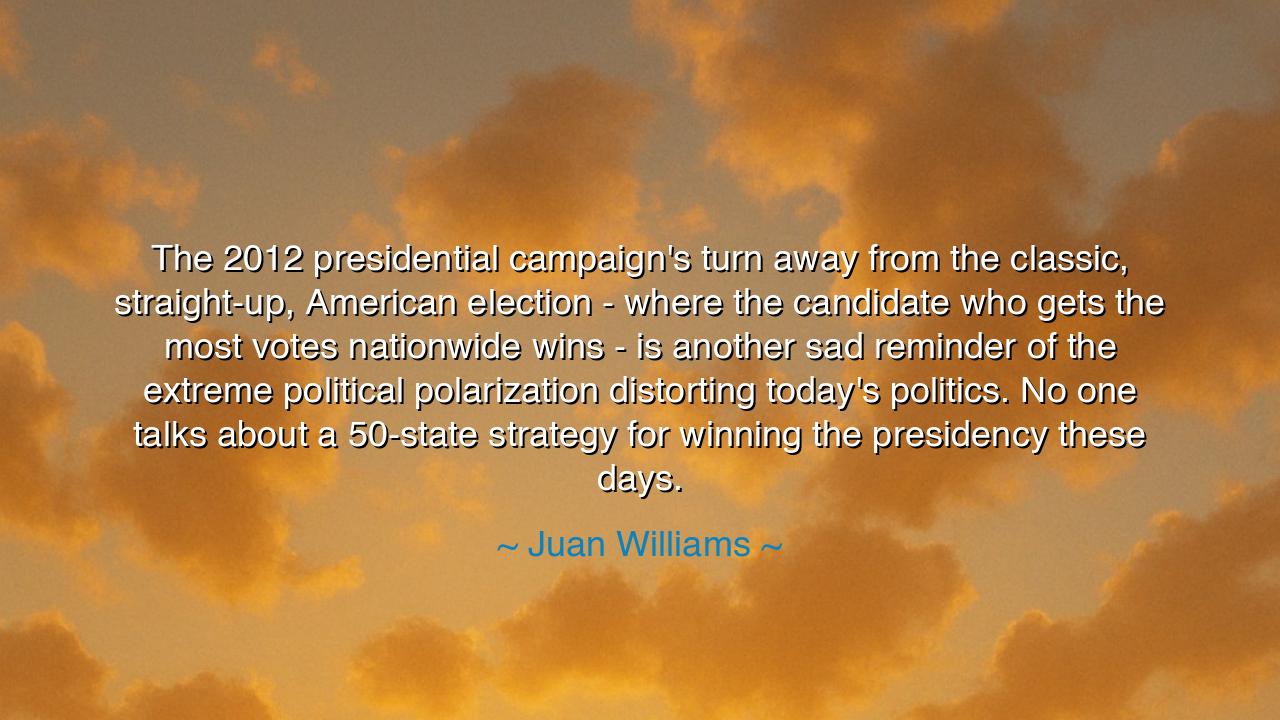
The 2012 presidential campaign's turn away from the classic
The 2012 presidential campaign's turn away from the classic, straight-up, American election - where the candidate who gets the most votes nationwide wins - is another sad reminder of the extreme political polarization distorting today's politics. No one talks about a 50-state strategy for winning the presidency these days.






Hear the voice of Juan Williams, who speaks with lament and warning: “The 2012 presidential campaign’s turn away from the classic, straight-up, American election—where the candidate who gets the most votes nationwide wins—is another sad reminder of the extreme political polarization distorting today’s politics. No one talks about a 50-state strategy for winning the presidency these days.” His words reveal the decline of a noble idea—that the leader of a republic should be chosen as the unifying choice of all its people. Instead, we see a fractured land, where unity has withered and strategy has replaced vision.
The American election was once exalted as the model of self-government: one people, many voices, yet bound together by the principle that each vote carried equal weight in shaping the nation’s future. But as Williams observes, by 2012 the contests had grown narrower, consumed not with all fifty states, but only with a handful of battlegrounds, where resources, speeches, and promises were concentrated. This is the symptom of polarization: when a country no longer sees itself as one body, but as rival halves, each fighting for dominance rather than harmony. The dream of a national consensus is replaced by the calculation of advantage.
The ancients, too, saw such dangers. In the final days of the Roman Republic, politics ceased to be about the whole and became a struggle of factions. Senators no longer debated for the common good but schemed for their party’s triumph, for their tribe against the other tribe. From this division rose men like Caesar, who promised unity but delivered rule by force. Williams’s lament is the echo of this old lesson: when polarization takes root, the very soil of democracy weakens, and the republic trembles.
We have seen this in our own time, when the Electoral College and campaign strategy sever the voice of the majority from the final outcome. In 2012, as in other modern elections, the nation no longer asked, “What do the people as a whole desire?” but, “How may we gather just enough states, just enough votes in the right places, to prevail?” The 50-state strategy—the vision of appealing to all, of governing as one—was abandoned. And when leaders seek only the narrow path to victory, they plant seeds of bitterness, for half the nation feels unseen, unheard, discarded.
Yet, even in this lament, there is instruction. Williams calls this a sad reminder not to resign us to despair, but to awaken us to responsibility. If politics has grown fractured, then it is the duty of citizens to mend it. Division is not healed by silence or indifference, but by deliberate action: by insisting on leaders who speak to all states, not only the decisive few; by remembering that democracy is not the art of conquest, but the discipline of compromise and shared destiny.
The lesson for us is timeless: guard against the spirit of faction. Do not allow yourself to believe that your neighbor is your enemy simply because he votes differently. Demand from your leaders not strategies of division, but visions of unity. Remember that the republic is only as strong as the bonds of trust between its people. Where those bonds weaken, tyranny or chaos rushes in. Where they are strengthened, even vast differences may coexist in peace.
So let Williams’s warning be as the voice of the prophets of old. Do not be lulled into thinking that polarization is fate. Every citizen has power: the power to vote, the power to speak, the power to bridge. If you would preserve the republic, act not as partisans alone but as guardians of the whole. Insist upon the 50-state vision, the dream of a nation that belongs equally to all. For only then can the American election fulfill its promise—not a contest of tribes, but a covenant of one people, seeking together the common good.






AAdministratorAdministrator
Welcome, honored guests. Please leave a comment, we will respond soon